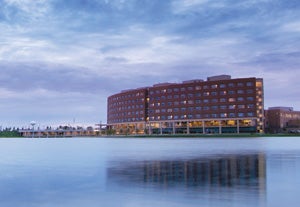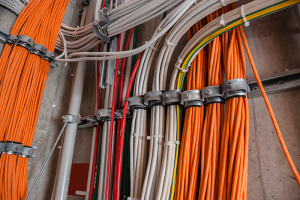Geothermal system savings are on track, despite a few bumps
 |
|---|
| Photo by James Jordan Photography The lake adjacent to Advocate Sherman Hospital is a key part of its geothermal heating and cooling system. |
The geothermal HVAC system that heats and cools Advocate Sherman Hospital, Elgin, Ill., is on track to pay for itself from the energy saved.
The system has saved from $600,000 to $1 million annually — depending on utility prices — by using 80 percent less natural gas and 72 percent less water compared with the old hospital's traditional mechanical system, says Ray Diehl, facilities manager, Sherman Hospital.
The system is expected to hit the break-even point in summer 2015, about five and a half years after the new hospital opened in December 2009. Sherman is the second hospital in the nation to install the system.
The system uses a closed loop of plastic piping through which a mixture of water and methanol either extract heat from the adjacent 15-acre, 18-foot-deep lake the hospital built or deposit heat there from the hospital.
The pipes are linked to 761 water-to-air heat pumps used for each of the 255 patient rooms, office areas, nurse stations and more. Another 132 water-to-water heat pumps are used to generate hot water for reheat for critical care areas.
The geothermal system cost about $6 million more than a traditional heating and cooling system, he says.
There have been challenges. Diehl calls it a "high-maintenance" system that involves continuous preventive maintenance of the hundreds of heat pumps. Plus, there are occasional leaks in the pipes.
In one incident, a leaking pipe caused the system's fluid to be dumped into a medical records office, which caused extensive damage. None of the 17 leaks over four-plus years of operation has harmed patients, he says.
Diehl recommends the system to others but with a few words of caution. "Stick with the design parameters and avoid too much value engineering," he says.




